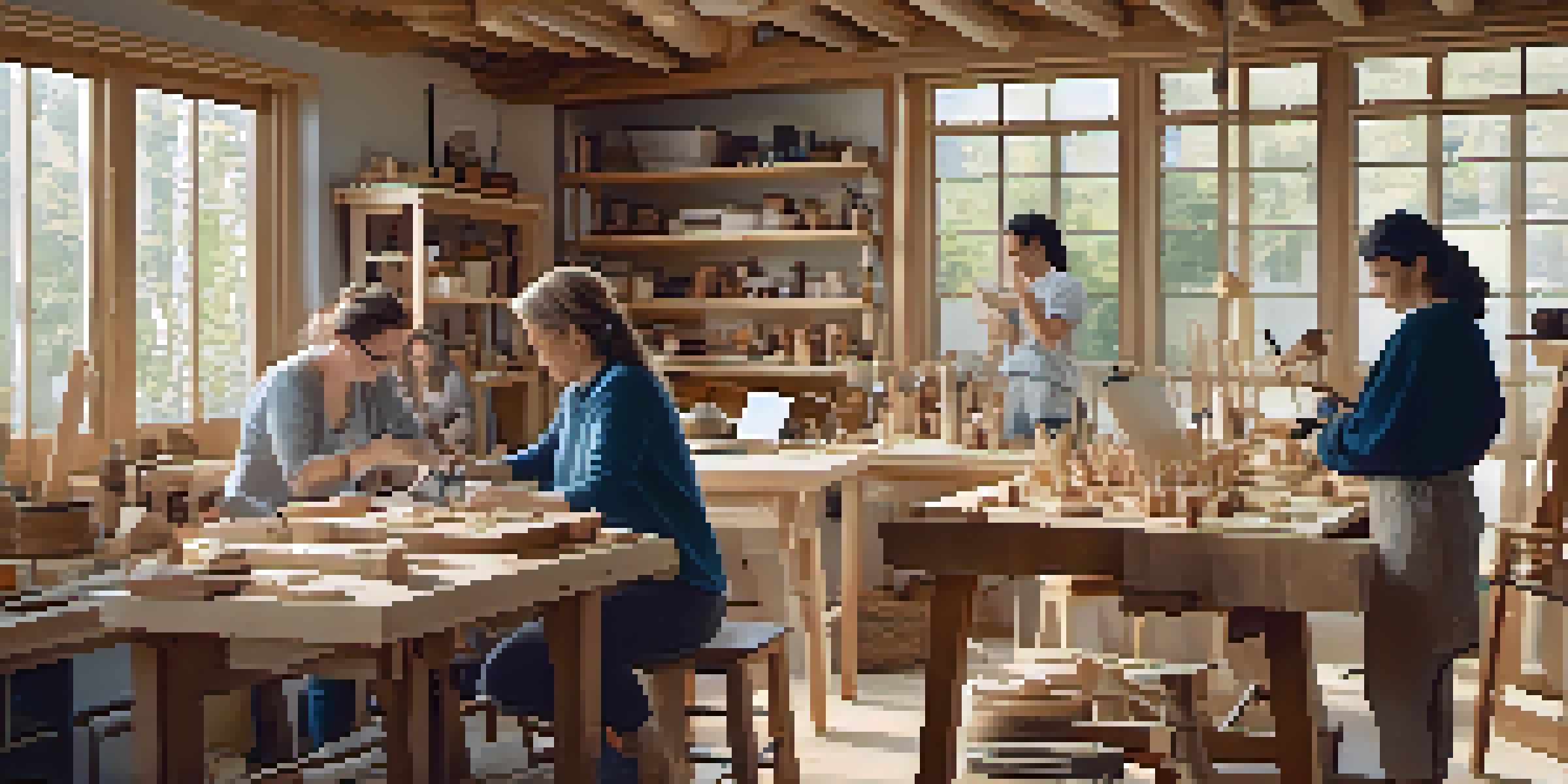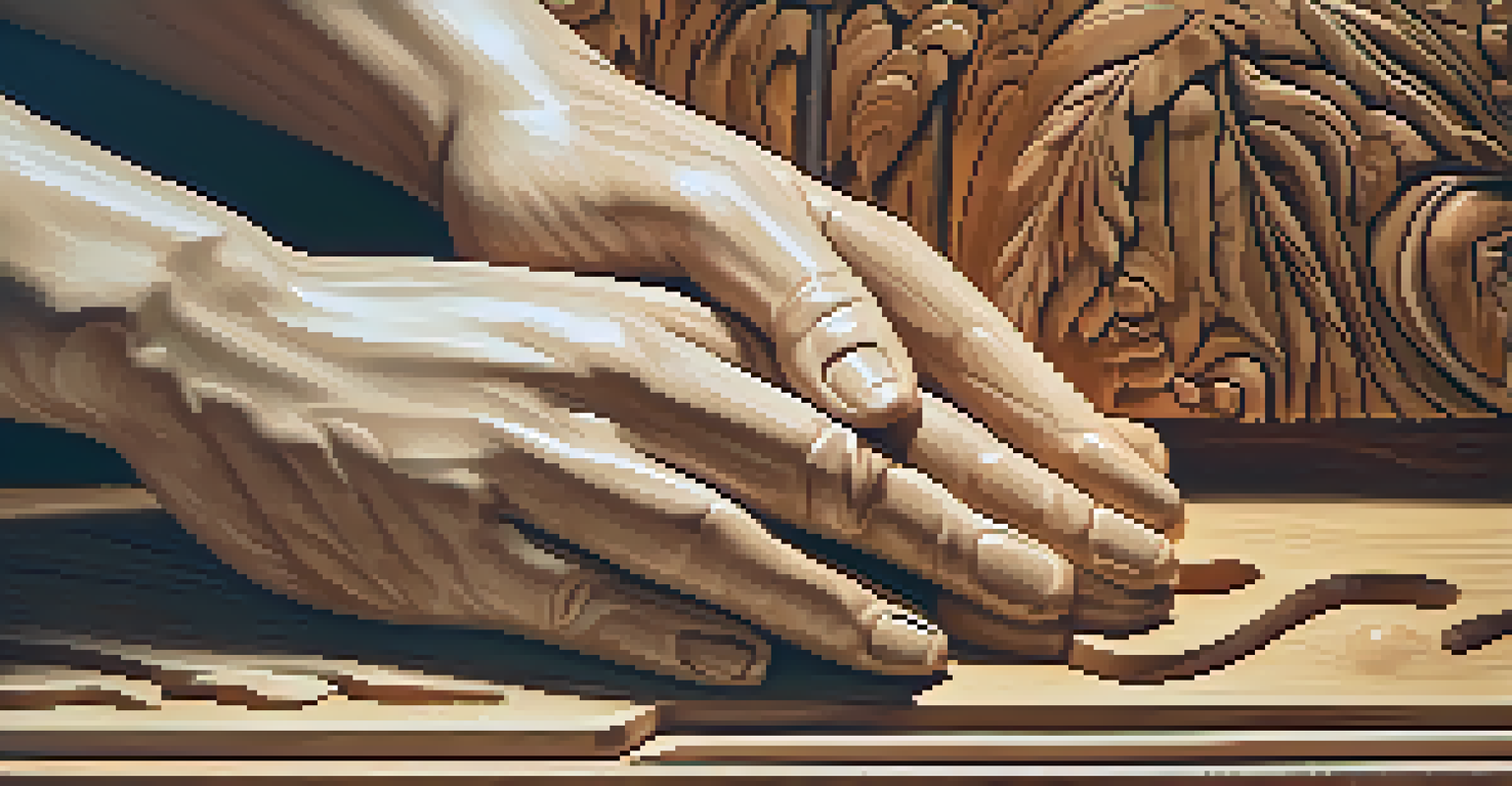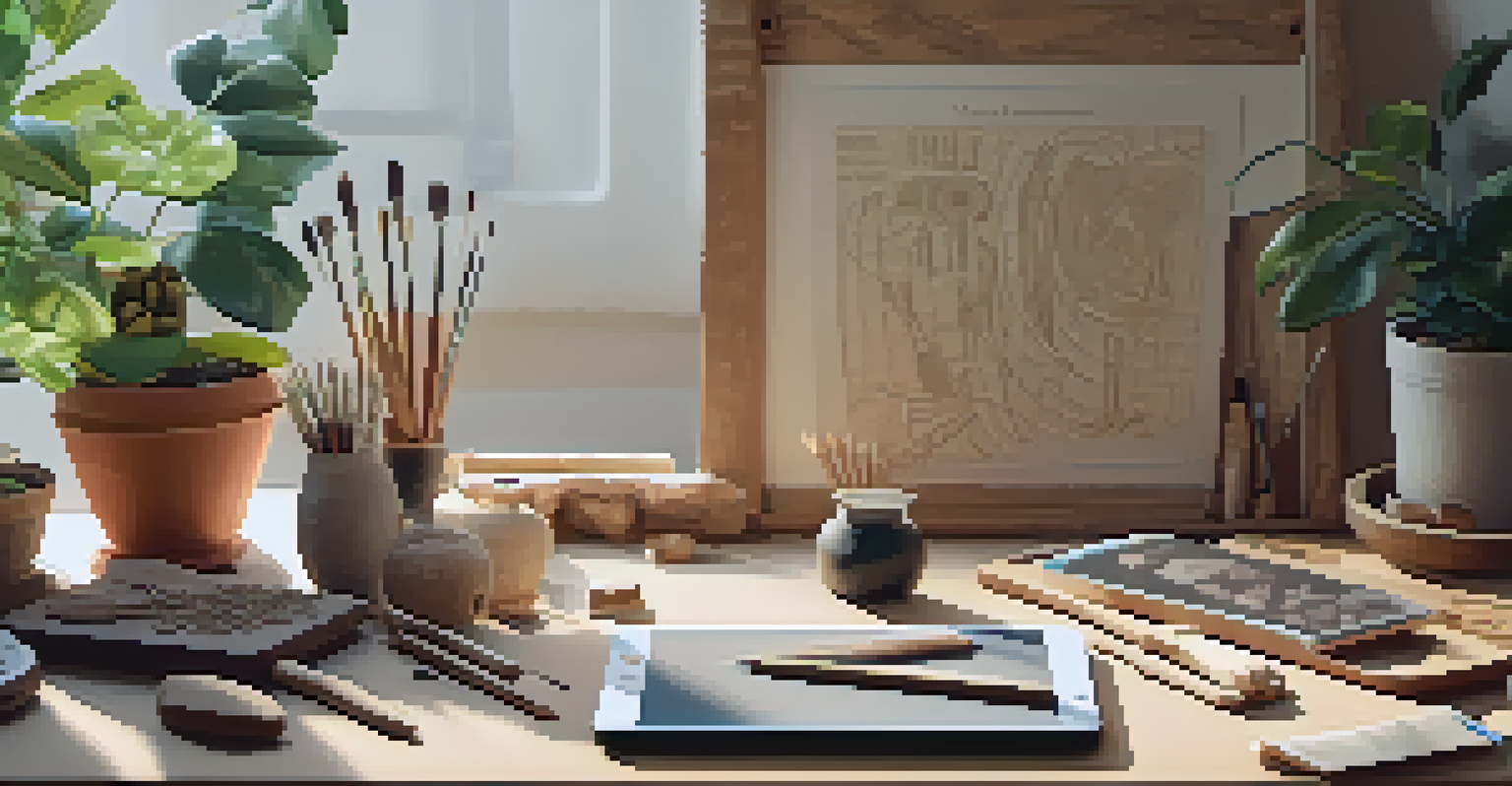Virtual Workshops: Learning Carving in the Digital Age

The Rise of Virtual Workshops in Creative Learning
In recent years, virtual workshops have surged in popularity, offering a unique platform for learning various skills, including carving. With the advent of technology, anyone with an internet connection can access expert instruction from the comfort of their home. This shift has democratized learning, making it possible for individuals across the globe to connect and share their creative journeys.
The beautiful thing about learning is that no one can take it away from you.
The convenience of virtual workshops is hard to ignore. They eliminate the need for travel and allow for flexible scheduling, catering to different time zones and personal commitments. This flexibility means you can learn at your own pace, pausing to practice a technique or revisit a particular lesson whenever you need.
Moreover, virtual workshops foster a sense of community among participants. Many platforms offer forums or chat features, enabling learners to share their progress, ask questions, and receive feedback in real-time. This supportive environment can enhance the learning experience, making it more engaging and enjoyable.
Essential Tools for Online Carving Workshops
Before diving into a virtual carving workshop, it’s important to gather the right tools. Depending on the type of carving you’re interested in—be it wood, linoleum, or more modern materials—your toolkit may vary. Generally, having basic carving tools, a cutting mat, and safety gear, such as gloves, is essential to ensure a safe and effective learning experience.

In addition to physical tools, digital tools play a significant role in online workshops. Many instructors utilize video conferencing software that allows for close-up demonstrations, making it easier to follow along. Screen sharing can also enable participants to view intricate techniques up close, providing clarity that enhances understanding.
Virtual Workshops Boost Accessibility
Virtual workshops make creative learning accessible to anyone with an internet connection, allowing people worldwide to connect with expert instruction from home.
Don’t overlook the importance of a good workspace, either. Setting up a dedicated area where you can focus on your carving without distractions will help you maximize your learning. Make sure this space is well-lit, organized, and stocked with all the materials you'll need for your projects.
Choosing the Right Virtual Carving Workshop
With a plethora of virtual carving workshops available, selecting the right one can feel overwhelming. Start by considering your skill level and the specific type of carving you want to learn. Whether you’re a beginner looking for foundational techniques or an experienced carver seeking to refine your skills, there’s likely a workshop tailored to your needs.
Creativity takes courage.
Researching the instructor is also crucial. Look for workshops led by experienced carvers with a strong teaching background. Many instructors provide videos or samples of their work, which can give you insight into their style and approach, helping you decide if their teaching method aligns with your learning preferences.
Finally, read reviews from previous participants. Feedback can provide valuable information about the workshop’s structure, content, and overall experience. A workshop with positive testimonials is often a good sign that you’ll receive quality instruction and support as you develop your carving skills.
The Benefits of Learning Carving Online
One of the greatest advantages of learning carving online is accessibility. No matter where you are, you can join workshops led by skilled artists from around the world. This opens up a wealth of knowledge and diverse techniques that might not be available locally, allowing you to broaden your artistic horizons.
Online learning also offers a unique opportunity for self-paced education. Unlike traditional classrooms, you can revisit lessons, practice at your convenience, and take the time you need to master specific skills. This tailored approach can lead to a deeper understanding and greater retention of carving techniques.
Community Enhances Learning Experience
The interactive nature of virtual workshops fosters a supportive community where participants can share progress and receive real-time feedback.
Moreover, engaging with a global community of fellow learners can be incredibly inspiring. Sharing your work online and receiving feedback from others can motivate you to push your creative boundaries. This sense of camaraderie can turn solitary practice into a collaborative journey, enriching your carving experience.
Common Challenges in Virtual Learning and Solutions
While virtual workshops offer numerous benefits, they can also present unique challenges. One common issue is the lack of hands-on guidance that in-person classes provide. To overcome this, consider joining workshops that offer live demonstrations, where instructors can provide immediate feedback and address your questions as they arise.
Technical difficulties can also be a hurdle in virtual learning. Issues such as poor internet connectivity or unfamiliarity with the software can disrupt the experience. To mitigate this, ensure you have a reliable internet connection and familiarize yourself with the platform before the workshop begins. Many instructors provide tech support or pre-workshop sessions to help participants get set up.
Lastly, maintaining motivation can be tricky when learning online. It’s easy to get distracted at home, so setting specific goals for each session can keep you focused. Creating a schedule and holding yourself accountable, perhaps by sharing your goals with a friend or fellow workshop participant, can help you stay on track and make steady progress in your carving journey.
Exploring Creative Projects Through Virtual Workshops
Virtual carving workshops often feature a variety of creative projects that allow you to apply your skills in real-time. From simple wood sculptures to intricate designs, these projects can ignite your imagination and encourage experimentation. Participating in guided projects not only enhances your learning but also results in tangible creations you can be proud of.
Many workshops also encourage participants to develop their styles and explore personal projects. As you gain confidence in your carving abilities, you might find inspiration to tackle larger or more complex pieces on your own. This transition from guided practice to independent creation is a significant part of the learning process.
Challenges in Online Carving Learning
Despite their benefits, virtual workshops can pose challenges such as technical issues and lack of hands-on guidance, which can be mitigated with proper preparation and goal-setting.
Sharing your completed projects with fellow participants can create a sense of accomplishment and community. Online platforms often provide opportunities for showcasing your work, allowing you to celebrate your achievements and receive constructive feedback. This exchange can be incredibly rewarding and can further fuel your passion for carving.
The Future of Carving Education in a Digital World
As technology continues to evolve, the future of carving education looks promising. Virtual workshops are likely to become even more interactive, incorporating advanced features like virtual reality or augmented reality to enhance the learning experience. Imagine being able to practice carving techniques in a simulated environment before working on your actual projects.
Additionally, the rise of social media and online communities means that learning doesn’t have to stop when the workshop ends. Many artists are sharing their processes and tips on platforms like Instagram and YouTube, creating an ecosystem of continuous learning. This allows aspiring carvers to explore new techniques and stay inspired long after their formal education.

Ultimately, the integration of technology into carving education opens doors for creativity and innovation. As more people embrace virtual learning, we can expect a diverse range of carving styles and techniques to emerge, enriching the art form as a whole. The digital age is not just transforming how we learn; it’s reshaping the very landscape of artistic expression.